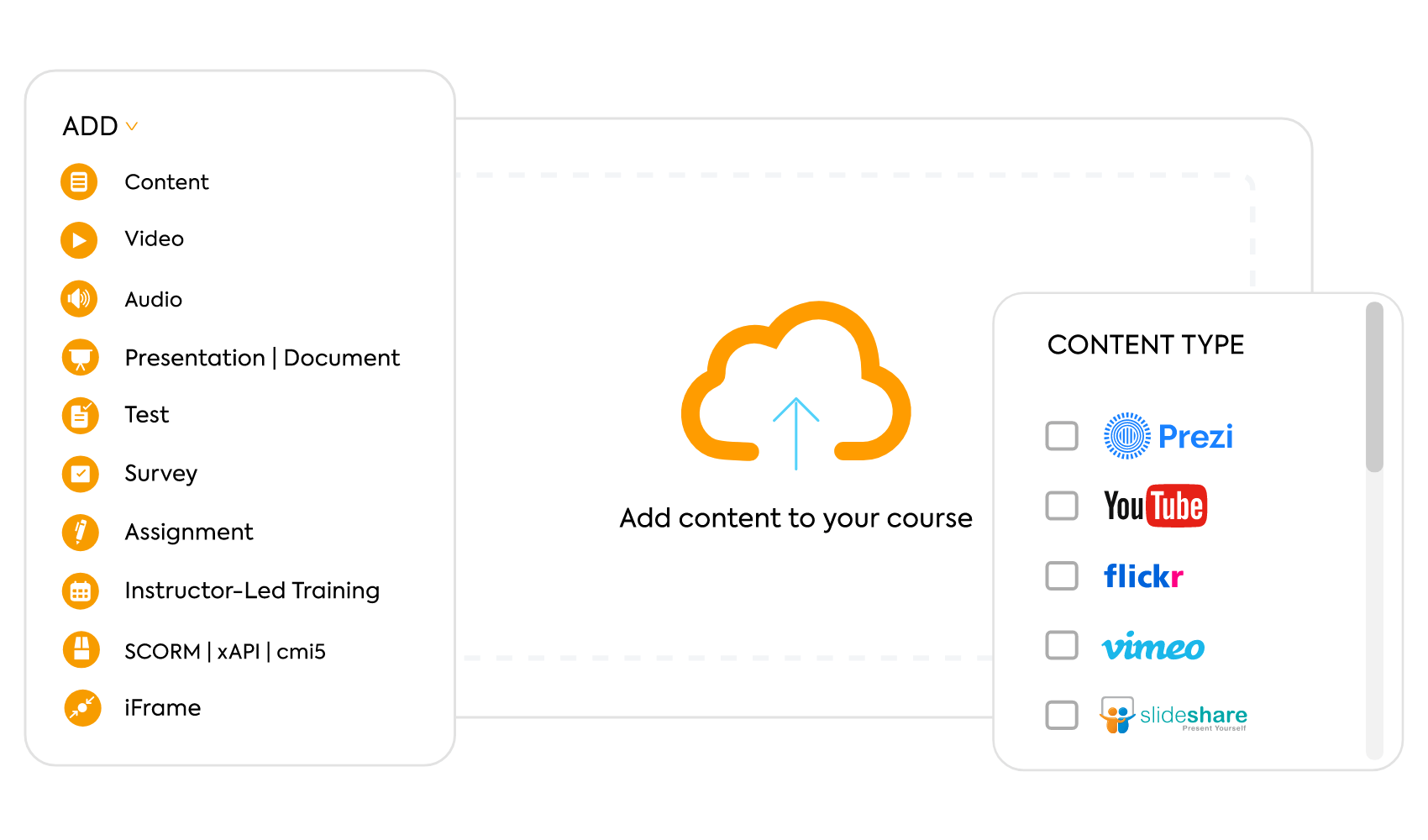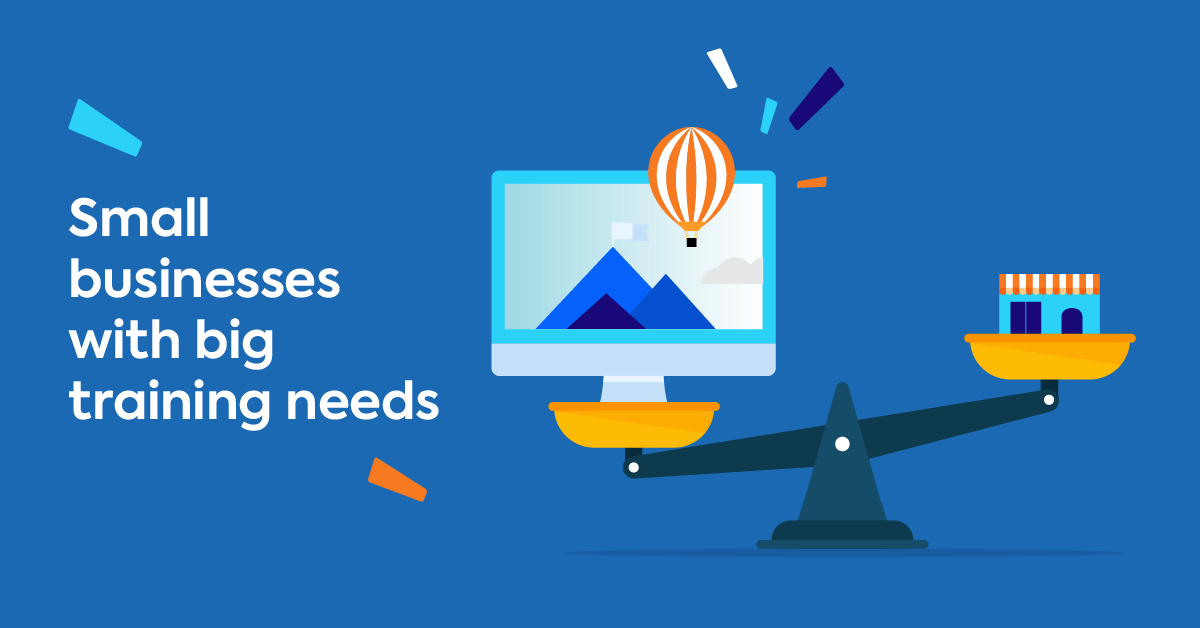Small business, big headaches. Managing any business requires energy, dedication, and resources you don’t always have. For a small business, though, mishaps like a seasoned employee handing in their resignation or a couple of “dry” months are hard to overcome. With your focus turned on sustaining your business and sticking to your budget, small business employee training often takes the back seat.
And while they may offer some training, lots of small businesses hesitate to invest in a training platform. An LMS would help deliver consistent, streamlined, and flexible training. But, it’s expensive and small businesses can’t afford it. Right?
Not quite. Let’s debunk some common LMS myths that have been hindering you from making this essential, and absolutely worthwhile, investment.
3 myths about LMS and small businesses you need to forget about
Myth #1: “LMSs are for large companies.”
Investing in an LMS when your company only has 50 employees sounds like buying a 4-gallon cart of milk for one. Such a waste… Only that’s not 100% accurate. A training platform, especially a cloud LMS, is a scalable solution for businesses of all sizes.
When using an LMS for small businesses, you can have as many or as few courses as you like. In fact, you don’t even have to create large training programs. You can upload training material that covers your current needs, add a couple of videos if you want, and you’re ready. The LMS won’t judge you. And it doesn’t care if only ten learners log in, or one hundred.
Myth #2: “We don’t have the technical expertise to support an LMS.”
Another popular misconception about LMSs is that they’re complicated platforms that require advanced technological knowledge. In reality, figuring out how an LMS works is not that harder than resetting the clock on your oven.
Jokes aside, setting up an LMS is simple. So simple it can be summed up in 3 steps: open a course, upload learning content, and enroll students. The hardest part of building an online course is creating or finding worthy learning material. Of course, a Learning Management System for small business has a solution for this, too. But more on that later.
Myth #3: “A small business like us can’t afford to buy an LMS.”
This myth feeds on the most common pain point of small businesses: limited budget. And it makes sense that if you already think that LMSs are complex platforms designed for large companies, they must be expensive, too.
You’ll be happy to know that there are actually platforms out there you can use for free. And even as you grow and add more users, the digits won’t go up as steeply as your anxious brain is imagining. Training software for small business is and will remain budget-friendly like you need it to be. You just need to pick the right one.
Train your teams without breaking the bank with TalentLMS
The training platform that users consistently rank #1.
Easy to set up, easy to use, easy to customize.
6 (big) reasons why a small business needs an LMS
Doesn’t it feel nice to know that an LMS is not some high and mighty software that is just too good for your small business? That’s right. An LMS for small businesses is the greatest business ally you could hope for.
Without further ado, let’s see 6 reasons why your business should invest in a Learning Management System today.
1. Cut down on training costs
The struggle is real, but the dilemma is false. When it comes to the most cost-effective training solution, there’s not much to think about. Using an LMS for employee training is the best way to cut down on cost and deploy employee training on a budget. And here’s why.
On-site training hurts your budget in more ways than you realize. Think about instructor fees, time lost from work, and possibly traveling and accommodation costs. These expenses are obvious. Then, there’s a sneaky way on-site training cuts into your budget: it happens once, then it disappears forever.
What are your options when a new employee comes in? Usually, you’d have to arrange training all over again or assign onboarding to an employee you trust. In a more pessimistic scenario, you leave the new hire with significant knowledge gaps. (If all this sounds inflexible as well as expensive, it’s because it is.)
With an LMS, you create your course once, and that’s all. No need to hire an instructor, or for employees to take time off work when things are busy. No need to organize training from scratch, as your training courses will be readily available when new team members join in. And if you need to add more learning material to improve or update your course? It’s as easy as the hit of a button.
2. Standardize training
You’ve managed to organize this super-informative 3-hour seminar on workplace safety. You bring in an expert to share their wisdom, and employees attend enthusiastically. Some even join in with questions and input of their own. Everything goes great.
Although there’s nothing wrong with this picture, here are a couple of additional thoughts: Employees will forget most of what they learned if they don’t practice. Plus, some might have been daydreaming and not truly listening as you thought they did. Not to mention that whoever is there, is there. New employees, or those that couldn’t make it, missed a valuable learning opportunity.
What if instead of a seminar, you created and hosted a webinar through your LMS? This way, employees could join the webinar from anywhere, or view the recording at a different time if they can’t make it for the live event. Or, they could complete the course on their own time if you chose to upload a series of short videos and infographics.
The differentiator factor, here, is that all employees have the same learning experience. No one is left behind because they couldn’t attend a live, in-person presentation. And no one is forced to remember everything after attending one session or taking a single course. An LMS gives learners the flexibility to learn from anywhere, at any time, and gives them access to training material so they can refresh their memory when they need to.
3. Create a training course with no hassle
Some people are born athletes, musicians, actors. But no one is born an instructional designer. No one instinctively knows how to pick the most effective content for compliance training, or whether it’s best to have one quiz at the end of the course or many smaller ones throughout.
That’s OK. Because if you’re not sure how to start with your course development, an LMS gives you a very, very easy way out: off-the-shelf content.
Training for small businesses doesn’t always come easy. You might not feel up to the task or can’t afford to pay a professional (or more) to develop content for you. If your LMS offers a library of ready-made courses, you can simply pick the ones you want (or all of them) and your employees will get instant access to a wide range of topics. From workplace ergonomics to data analysis, employees will expand their knowledge and hone skills that will enable them to thrive in the workplace.
And if you want to create your own courses, your LMS will guide you step-by-step. Depending on the platform you choose, you should be able to upload anything, from presentations you already have in place to YouTube videos and audio files, or even use the course editor to create new content on the spot.

Create online courses in just a few clicks with TalentLMS
Design new content from scratch with an intuitive course editor,
or use the drag and drop feature to upload existing material.
4. Enhance workplace culture
Workplace culture is not a throwaway term or some fad that will eventually fade. Time and again it’s been proven that a toxic work environment is detrimental to employee morale and productivity, and unmistakably leads to turnover. The same way people need to feel calm and safe in their homes, they need to feel happy and stress-free in their workplace. Therefore, it’s in everyone’s best interest to start cultivating a positive workplace culture.
Using your LMS, you can train your employees on topics like inclusion and diversity, or how to deal with workplace friction. Even a brief training course on company policies will be helpful in preventing tension since everyone will know what is acceptable in your workplace, and what’s not.
A more subtle way your LMS enhances workplace culture is by facilitating lifelong learning. When employees are shifting their energy towards their professional development, they have no reason to indulge in competitive behavior. Or, to look for more challenging job opportunities elsewhere.
5. Improve employee performance, for good
Choosing the best LMS for your small business, with features that bring value, can boost employee performance. Your LMS should support different types of content and effective learning methods, like social learning and gamification. This will enable employees to learn better and faster, and retain this knowledge.
An LMS for small businesses is more than a short-term solution to productivity issues. It helps improve and maintain high employee performance in the long run. With a mobile-friendly LMS platform, employees can carry knowledge on their mobile devices and turn to it before meeting a client or when they are performing a task. With an LMS, you can also create expiring certificates easily and activate push notifications to remind employees to refresh their training.
6. Grow your business
Let us let you in on a little secret: all large companies started out as small. What made them grow into powerful, respectable businesses is hard work, careful planning, and persistence. And a skilled workforce. Because employees are the ones turning ideas into high-quality products and services. Your employees are interacting with customers, doing quality assurance checks, and executing your marketing strategy.
Therefore, investing in an LMS is the first step to transforming your business from a small company to a blooming business, and a workplace where employees find room to grow their skills and evolve. An LMS for small businesses delivers effective training to your employees, so they get better at their jobs.
Customers and business partners are happy. Employees are happy, too. You get more clients, profit increases, and your small business grows into something big.

So, which LMS to choose?
A Learning Management System for small business is the gift that keeps on giving. Want to make sure you’ve picked the best LMS for your small business? Choose a platform you can use for free. This way, you can test whether it’s the best solution for you before committing to buy.
And when you’re ready to make a long-term investment, have a look at the pricing. Opt for vendors with flexible pricing plans. Small businesses might not need to use all features, so a basic and cost-effective plan would be ideal. For now. An LMS that grows as you grow will make sure that you pay for exactly what you need—and no more than that.
